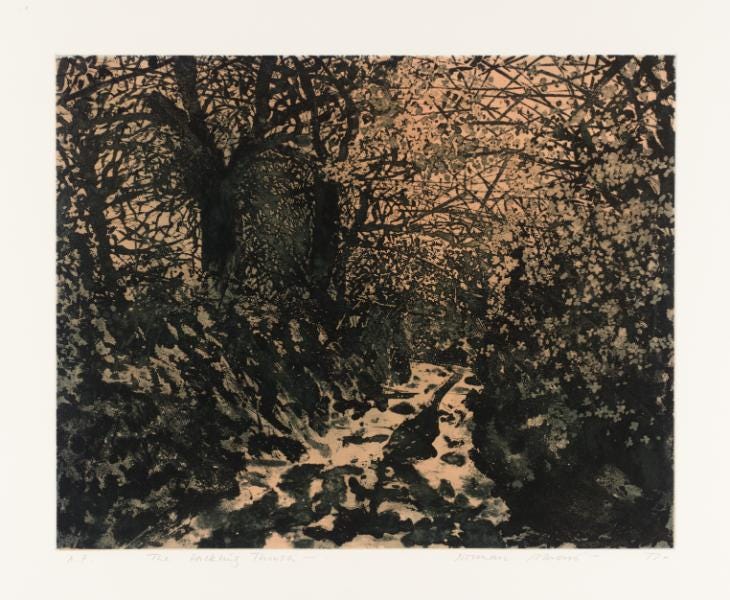Thrush
The sky is the orange outside of a shell; the sward of icy grass the pale blue inner smooth and frozen. Dark trails of path and wheel rut snaking into the distance just as I my wandering drawn line would want to draw them. Breath funnels, chuff-chuffs. I am a steam engine.
Every footstep leaves behind a break of ice, a muddy indent, a long squeal-squeak of water squeezing back through ice capillaries. In the wetter areas each step wobbles the whole plane sending dominos of crickle-crackle into the far frozen earth. The whole world is connected by frost.
In a cloak of cold the radiation glow of sun washes warm orange waves that act separately to the cold. I am on fire, frozen solid. Day unthaws night as I make my way down to the pond.
It's a slow, lazy wander I walk. Morning, birds! Wren, a couple of tits. A deer track in the mud. A rollercoaster pigeon bell-curving over a clump of trees. The ice is burning off, the trees echo with gold, wallow and fuzz richly in moss green.
I pause for a while on a stretch of hedgerow and watch a pair of song thrushes at the top of a tree. One darts down into the bramble, flashing white against the green ivy. a smattering of redwing marauding through the bushes. We have a couple more months with this beautiful thrush before they leave with winter and head north to their breeding grounds in Scandinavia. The song Blackbirds and Thrushes floats into my head and I sing it as I tramp down by the woodland, watching a choir of goldfinches rehearsing haphazardly in the tree tops.
So many folksongs involve the natural world, whether directly or indirectly. More often than not it provides a backdrop for the human action. Blackbirds and Thrushes falls very much into this category. Collected in the early 19th century, this lament against the tragedy of war, opens in a green meadow where the narrator meets a fair maid afraid for the life of her lover gone off to war. The blackbirds, thrushes, lark and dove "seem to mourn for this maid", a standard human proposition that nature somehow reflects our mood, or even determines it. In the final verse Jimmy (or Jemmy, depending on the version) returns from war to find that Mary has died. A simple reminder that death has little sympathy for the living, and ultimately that the natural world gives and takes without heed to us.
On my way home I watch a greater spotted woodpecker pecking his way up a branch. The white world has turned green and gold, orange, brown and sky blue. I pass an ivy covered tree that looks just like a watching hare.
PS. The artwork above is after Thomas Hardy’s poem The Darkling Thrush. Well worth a read.


